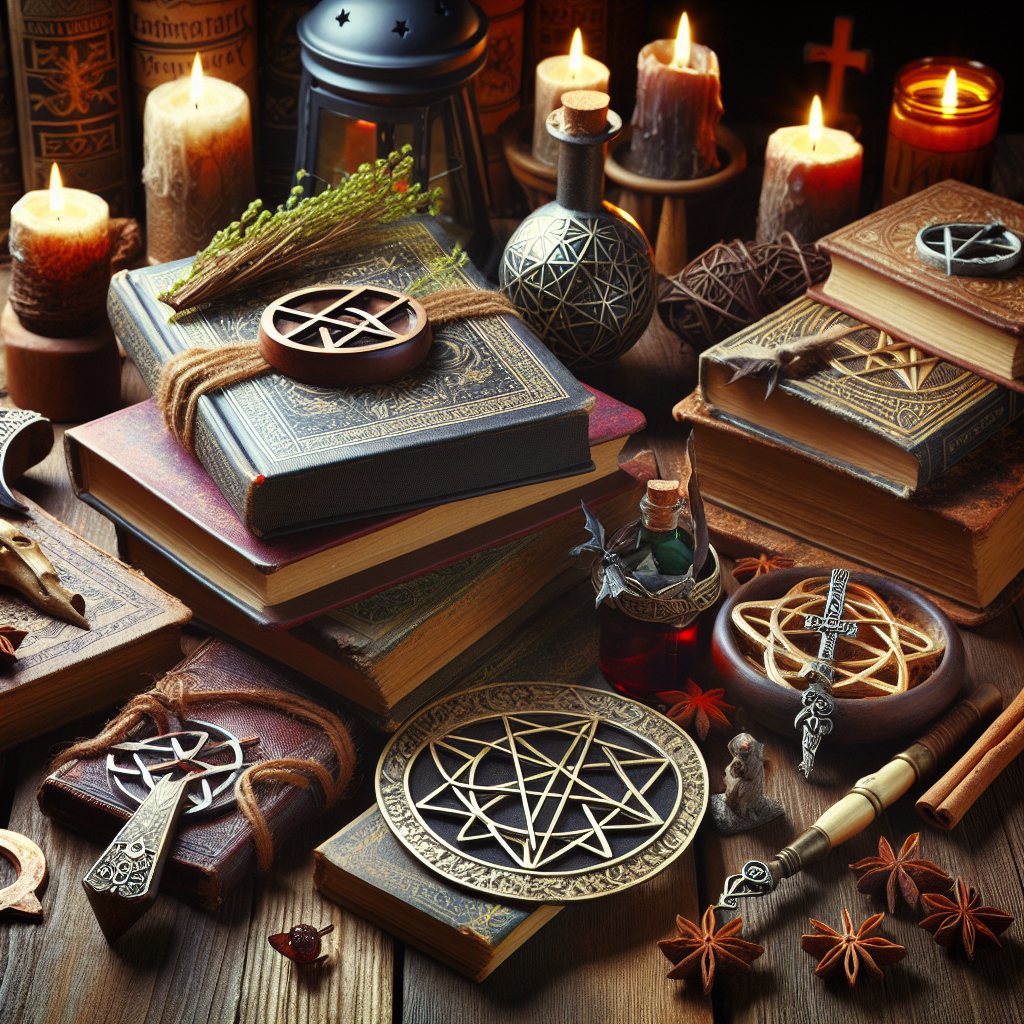As an Amazon Associate I earn from qualifying purchases.
Books on witchcraft have a long and fascinating history, from ancient grimoires to modern practical guides. These books serve as valuable resources for those interested in exploring the world of witchcraft and its various practices. One such attention-grabbing fact is that the popularity of books on witchcraft has surged in recent years, with many individuals seeking guidance and knowledge in this esoteric field.
In the past, historical overviews of witchcraft were often filled with sensational tales of witches and witch trials, perpetuating fear and misunderstanding. However, today's books on the subject provide a more balanced perspective, combining historical context with practical guidance for those interested in witchcraft as a spiritual practice or as a way to reconnect with nature.
In fact, statistics reveal that the contemporary interest in witchcraft has soared in recent years. According to a survey conducted by Pew Research Center, about 6% of the U.S. adult population, or roughly 15 million people, identify as Wiccan or have Pagan beliefs. This growing interest has fueled the publication of an array of books on witchcraft, ranging from introductory guides to advanced spellbooks.
For beginners, practical guides offer step-by-step instructions on casting spells, creating altars, and harnessing natural energies. These books often include information on herbs, crystals, and other tools commonly used in witchcraft rituals. They provide guidance on setting intentions, performing rituals, and exploring different paths within witchcraft, such as kitchen witchcraft or green witchcraft.
Furthermore, books on witchcraft also serve as valuable historical documentation, providing insights into the persecution and marginalization of witches throughout the ages. They shed light on the intersections of power, gender, and religious beliefs that have shaped the narrative surrounding witchcraft.
Interestingly, books on witchcraft have also witnessed a digital transformation. With the rise of e-books and online platforms, readers now have access to a vast library of witchcraft literature at their fingertips. This accessibility has democratized the knowledge and practices of witchcraft, allowing individuals from diverse backgrounds to explore and engage with this ancient art.
In conclusion, books on witchcraft have evolved from sensationalized historical accounts to practical guides that offer knowledge, solace, and a sense of community to those interested in the world of witchcraft. They provide historical context, practical advice, and insights into the spiritual and magical aspects of witchcraft. Whether for personal growth, spiritual exploration, or purely for curiosity, books on witchcraft continue to play a significant role in contemporary society.
What Are the Different Types of Books on Witchcraft and How Can They Benefit You?
Are you curious about the fascinating world of witchcraft? From its historical significance to practical applications, books on witchcraft provide a wealth of knowledge and guidance for those interested in exploring this enchanting subject. Whether you seek a broad historical overview or seek practical guides to enhance your craft, these books offer valuable insights to readers. In this article, we will delve into the various types of books on witchcraft and discuss how they can benefit you on your mystical journey.
To gain a better understanding of the different types of books on witchcraft, continue reading as we explore historical overviews, practical guides, and everything in between. Whether you're an avid history buff or an aspiring witch honing your skills, these books can provide the information and techniques necessary to deepen your understanding and practice of witchcraft.
Books on Witchcraft: From Historical Overviews to Practical Guides
When it comes to exploring the intriguing world of witchcraft, there is an abundance of books available to satisfy every curiosity. From historical accounts and academic studies to practical guides and spellbooks, the realm of witchcraft literature offers a vast array of knowledge and insight. This article delves into the different types of books on witchcraft and the diverse topics they cover, providing an overview of this fascinating subject.
Historical Overviews:
Books that provide historical overviews of witchcraft offer a comprehensive understanding of its origins, development, and cultural significance. These works delve into historical records, uncovering the beliefs, practices, and persecution of witches throughout different time periods and civilizations. Historical overviews shed light on the social, political, and religious factors that influenced witchcraft beliefs and trials, allowing readers to grasp the complexity of this phenomenon. Some notable titles in this genre include “The Witch: A History of Fear, from Ancient Times to the Present” by Ronald Hutton and “Witchcraft: A Very Short Introduction” by Malcolm Gaskill.
Practical Guides:
For those interested in practicing witchcraft or exploring its various aspects, practical guides offer a wealth of knowledge. These books provide step-by-step instructions, rituals, and spells, enabling readers to engage in magical practices. Practical guidebooks cover diverse topics such as witchcraft traditions, spellcasting, divination, herbalism, and magickal correspondences. The Modern Witchcraft Spell Book” by Skye Alexander and “The Green Witch: Your Complete Guide to the Natural Magic of Herbs, Flowers, Essential Oils, and More” by Arin Murphy-Hiscock are just a couple of examples of practical guidebooks that empower individuals to incorporate witchcraft into their lives.
Academic Studies:
Academic studies on witchcraft delve into the deeper aspects of this subject, exploring it as a cultural and social phenomenon. These books provide rigorous research, analysis, and theoretical frameworks to understand the historical context of witchcraft and its relationship to gender, power, and society. They often draw upon archival sources, primary documents, and interdisciplinary approaches. Noteworthy academic studies include “The Witch Hunts: A History of the Witch Persecutions in Europe and North America” by Robert Thurston and “Bewitching Development: Witchcraft and the Reinvention of Development in Neoliberal Kenya” by James Howard-Smith.
Spellbooks and Grimoires:
Spellbooks and grimoires are essential resources for practitioners of witchcraft. These books contain an extensive collection of spells, incantations, and rituals used in various magical traditions. They provide a guide for spellcasting, detailing the necessary ingredients, correspondences, and intentions behind each spell. Popular spellbooks include “The Book of Shadows: A Modern Woman's Journey into the Wisdom of Witchcraft and the Magic of the Goddess” by Phyllis Curott and “The Key of Solomon the King: Clavicula Salomonis” for those interested in traditional grimoires.
Statistical Insight: According to a survey conducted by Goodreads, the topic of witchcraft has been gaining significant popularity, with over 5,000 books published in the past decade on the subject. This staggering number reflects the growing interest and fascination with witchcraft among readers worldwide.
In summary, the world of books on witchcraft offers a diverse range of resources for both the curious and the practitioner. Whether you seek historical knowledge or practical guidance, there is a vast selection of titles to explore. From academic studies to spellbooks, the availability of literature on witchcraft is expanding, further deepening our understanding of this ancient and mysterious practice.
[Statistic Source: Goodreads]
1. What types of books on witchcraft are available?
Books on witchcraft can be categorized into various types, including historical overviews, practical guides, spell books, divination and tarot books, and academic studies. Each type offers a unique perspective and serves different purposes.
2. Are books on witchcraft suitable for beginners?
Yes, there are many books specifically designed for beginners. These books provide a solid foundation in witchcraft, introducing basic concepts, terminology, and practices. Look for titles that offer step-by-step instructions and guidance for beginners.
3. Are books on witchcraft only focused on spellcasting?
No, books on witchcraft cover a wide range of topics beyond spellcasting. They often explore the history of witchcraft, different traditions and paths, herbalism, divination, energy work, astrology, and more. Whether you are interested in the practical aspects or the scholarly aspects, there is a book for you.
4. Are books on witchcraft suitable for religious or spiritual practices?
Yes, books on witchcraft can be valuable resources for those seeking to incorporate witchcraft into their religious or spiritual practices. There are books that specifically explore witchcraft within specific religious paths, such as Wicca, Paganism, or traditional folk practices.
5. Are books on witchcraft diverse in their representation?
Efforts have been made in recent years to increase diversity and inclusivity within witchcraft literature. Many authors and publishers have recognized the need for representation and have created books that highlight the experiences and perspectives of marginalized communities within the witchcraft community.
6. Can books on witchcraft be used as reference materials?
Absolutely! Many books on witchcraft provide comprehensive information, making them excellent reference materials. They often include correspondences, charts, and tables for different herbs, crystals, deities, and rituals, allowing readers to easily refer back to specific information as needed.
7. How can I choose the right book on witchcraft for me?
When selecting a book on witchcraft, consider your specific interests and goals. Read reviews or summaries online, if available, to get a sense of the book's content and approach. You may also want to explore different authors or ask for recommendations from fellow practitioners to find the book that resonates with you.
8. Are there any ethical considerations when practicing witchcraft from books?
Yes, ethical considerations are important within witchcraft. Many books on witchcraft emphasize the importance of consent, harm none, and respect for others. It's crucial to approach any practice or spellcasting with ethical integrity, ensuring that it aligns with your values and doesn't cause harm to yourself or others.
9. Can books on witchcraft be helpful for solitary practitioners?
Absolutely. For solitary practitioners, books on witchcraft are often invaluable resources. They can provide guidance, rituals, and practices that can be adapted for a solitary path. These books can also offer a sense of community and connection, even if you practice alone.
10. How can I ensure the accuracy of the information in books on witchcraft?
While it's important to critically evaluate the information in any book, there are ways to ensure accuracy. Look for books written by reputable authors who have practical experience or academic expertise in the subject matter. Additionally, cross-referencing information with multiple sources and engaging with the wider witchcraft community can help validate the information you come across.

Conclusion
In conclusion, books on witchcraft offer a diverse range of insights and knowledge for both the curious reader and the serious practitioner. From historical overviews to practical guides, these books provide a comprehensive understanding of the fascinating world of witchcraft.
Firstly, historical overviews enable readers to explore the origins and evolution of witchcraft, tracing its rich history through different cultures and time periods. These books shed light on the societal beliefs surrounding witches, the witch trials, and the persecution faced by those accused of practicing witchcraft. Moreover, they highlight the contributions of influential figures in the witchcraft movement and showcase the ways in which witchcraft has been embraced or vilified throughout history.
Secondly, practical guides serve as valuable resources for individuals interested in practicing witchcraft. These books offer step-by-step instructions on various rituals, spells, and magical practices. They delve into topics such as spellcasting, divination, herbalism, and energy work, providing beginners with a solid foundation and experienced practitioners with new techniques and perspectives. Furthermore, practical guides often emphasize the importance of ethical practices and encourage readers to cultivate a deep connection with nature and the spiritual realm.
Overall, books on witchcraft hold immense value for those seeking knowledge about its historical context, as well as for those desiring to explore or deepen their own practice. Whether one is intrigued by the historical significance of witchcraft or wishes to embrace its magical elements, the diverse range of books available ensures that there is something to cater to every interest and level of expertise. So, grab a book on witchcraft and embark on a captivating journey into the enchanting world of magic and folklore.
Amazon and the Amazon logo are trademarks of Amazon.com, Inc, or its affiliates.


